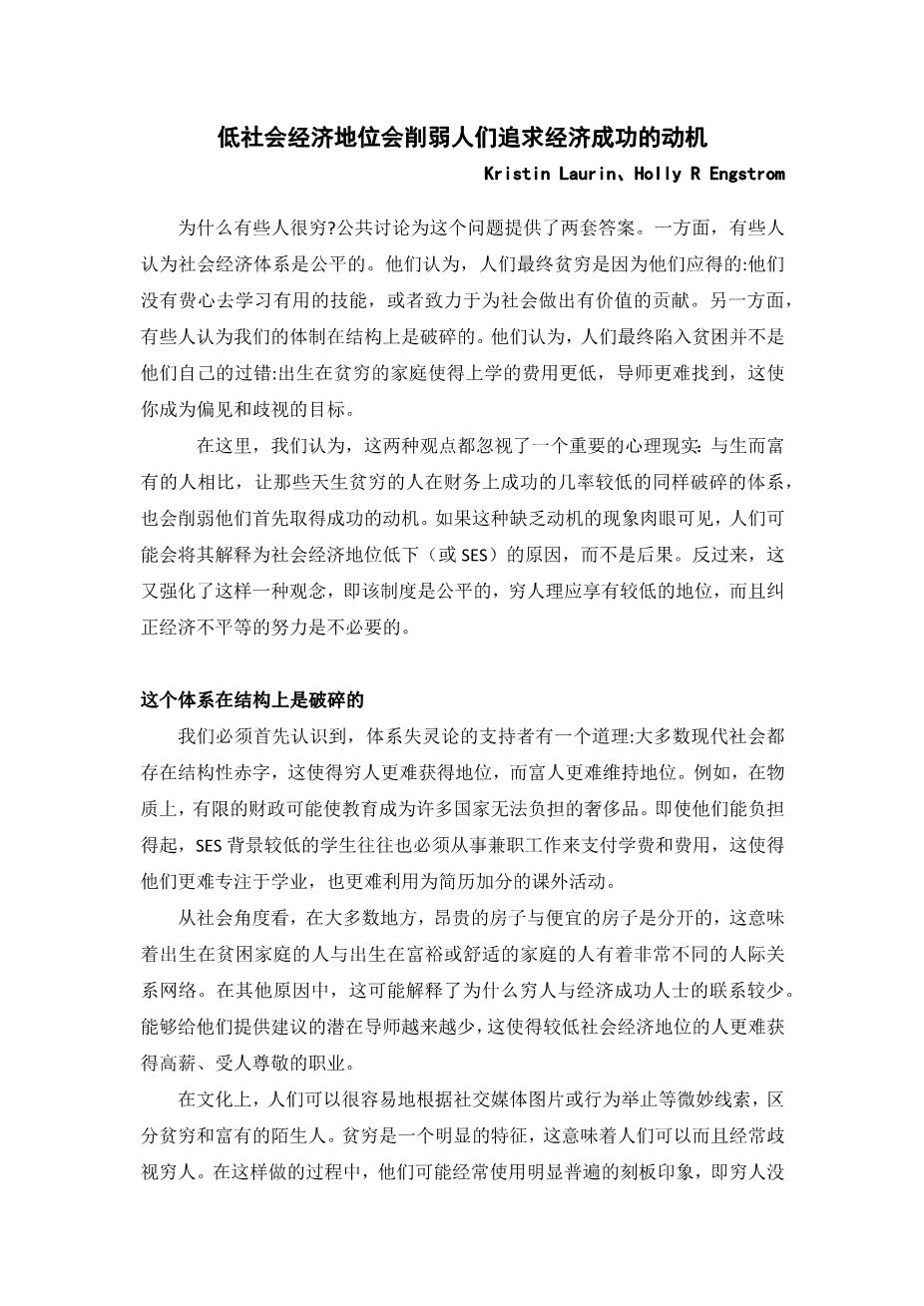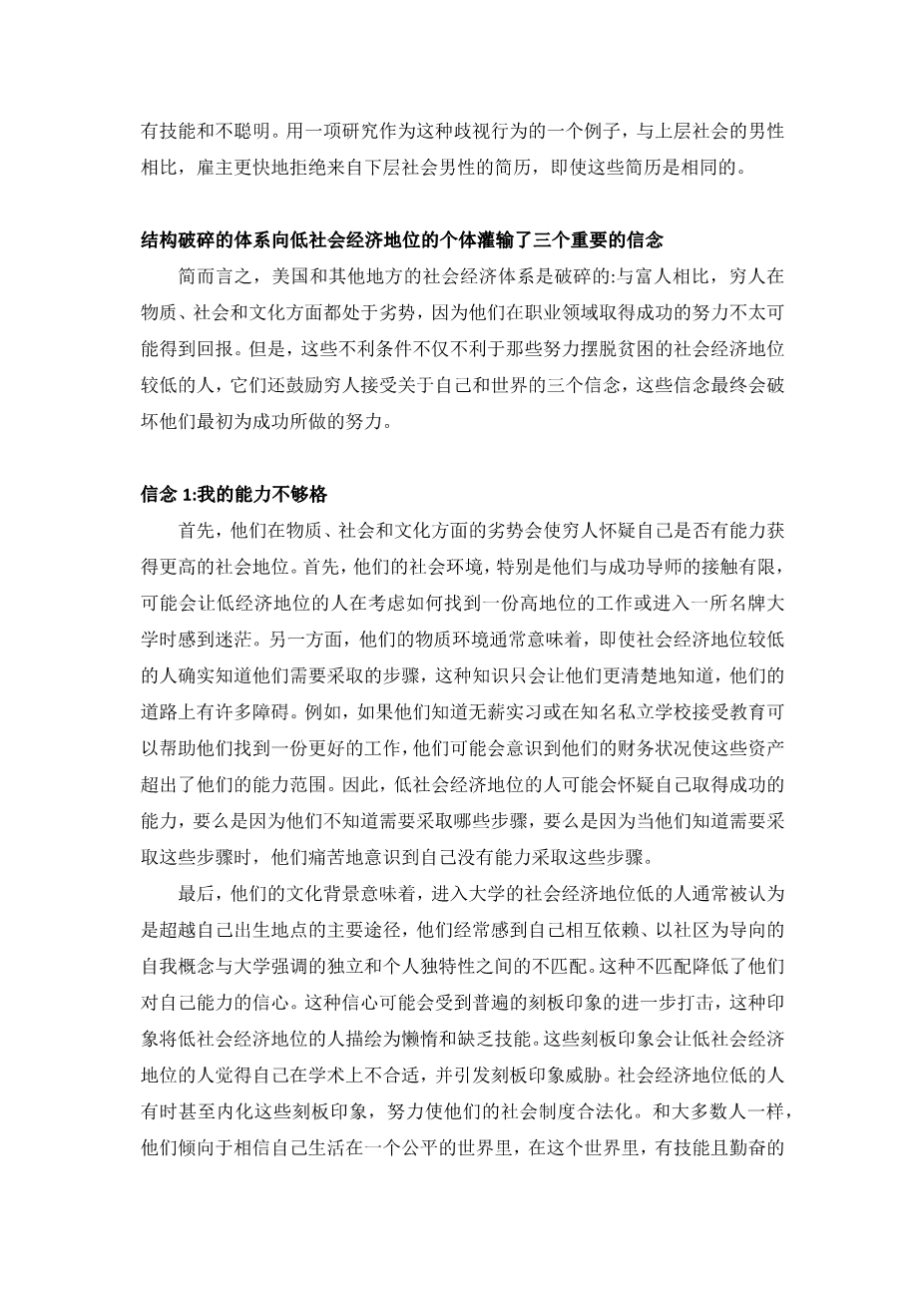The context of low socioeconomic status can undermine peoplersquo;s motivation for financial success
Kristin Laurin and Holly R Engstrom
Why are some people poor? Public discourse offers two sets of answers to this question. On the one hand, there are those who believe the socioeconomic system is fair. They argue that people end up poor because they deserve it : They have not bothered to acquire useful skills, or to apply themselves to making valuable contributions to society. On the other hand, there are those who believe that our system is structurally broken. They argue that people end up poor through no fault of their own : Being born into a poor family makes schooling less affordable and mentors harder to find, and it makes you a target for prejudice and discrimination.
Here, we contend that both these arguments ignore an important psychological reality: The same broken system that gives those born poor lower odds of financial success, compared to those born rich, can also undermine their motivation to achieve that success in the first place . If this lack of motivation is observable to the naked eye, people may interpret it as a cause, rather than a consequence, of low socioeconomic status (or SES). In turn, this reinforces the idea that the system is fair, that the poor deserve their low status, and that efforts to redress economic inequality are unnecessary.
The system is structurally broken
We must begin by recognizing that the proponents of the broken system argument have a point: Most modern societies have structural deficits that make it harder for the poor to achieve status than it is for the wealthy to maintain it. Materially, for example, limited finances can make education an unaffordable luxury in many countries . Even if they can afford it, students from lower SES backgrounds often must hold down part-time jobs to cover their tuition and expenses, making it harder for them to focus on their school work, and to take advantage of resumeacute;-building extracurricular activities.
Socially, in most places, more expensive homes are segregated from more affordable ones, meaning that people born into poverty have very different networks of relationships, compared to people born into wealth or comfort. Among other reasons, this may explain why the poor have fewer connections with financially successful others . Having fewer potential mentors available to advise them makes it more difficult for lower SES individuals to attain well-paying, wellrespected careers.
And culturally, people can readily distinguish poor from wealthy strangers, based on subtle cues like social media pictures, or behavioral mannerisms . That poverty is an observable characteristic means people can, and often do, discriminate against the poor. In so doing, they may often apply the apparently universal stereotype of the poor as unskilled and unintelligent . To use one study as an example of this discrimination in action, employers more quickly dismissed resumeacute;s coming from lower-class men,compared to upper-class men, even when these resumeacute;s were identical .
The structurally broken system pushes three important beliefs on individuals with low SES
In short, the socioeconomic system in the United States and elsewhere is broken: The poor are at a material, social and cultural disadvantage, compared to the wealthy, in the sense that their efforts to succeed in the professional world are less likely to pay off. But these disadvantages do not merely stack the deck against lower SES people who are striving to rise out of poverty—they also encourage the poor to adopt three beliefs about themselves and the world which ultimately undermine their very efforts to succeed in the first place.
Belief #1: My abilities do not measure up
First, their material, social, and cultural disadvantages can cause the poor to doubt that they are competent enough to achieve higher social status. For one thing, their social context, and specifically their limited access to successful mentors, may leave low SES people feeling lost when considering how to land a high-status job or get into a prestigious university . For another, their material context often means that, even if lower SES individuals do know the steps they need to take, this knowledge only makes plainer that there are many obstacles in their way. For example, if they know that an unpaid internship or an education at a prestigious private school would help them land a better job, they likely recognize that their finances place these assets out of their reach . Thus, low SES people may doubt their ability to get ahead either because they do not know the steps required, or because when they do, they are painfully aware of their inability to take these steps.
Finally, their cultural context means that low SES individuals who enter university—often touted as the primary route to rising above onersquo;s birth station—often feel a mismatch between their interdependent, communityoriented self-concept and the universityrsquo;s emphasis on independence and individual uniqueness. This mismatch lowers their confidence in their abilities. This confidence may take a further hit from pervasive stereotypes that portray low SES people as lazy and unskilled . These stereotypes can make low SES people feel they do not fit in academically and induce stereotype threat . Low SES individuals sometimes even internalize these stereotypes in an effort to legitimize their social system . They tend— like most other people—to want to believe that they live in a fair world where skilled and hardworking people are rewarded with success. Since they find themselves at the bottom of the hierarchy, one of way of maintaining their belief that society is fair is assuming that they must lack what it takes to get to the top.
Belief #2: Even if my abilities did measure u
剩余内容已隐藏,支付完成后下载完整资料


英语译文共 5 页,剩余内容已隐藏,支付完成后下载完整资料
资料编号:[590772],资料为PDF文档或Word文档,PDF文档可免费转换为Word


